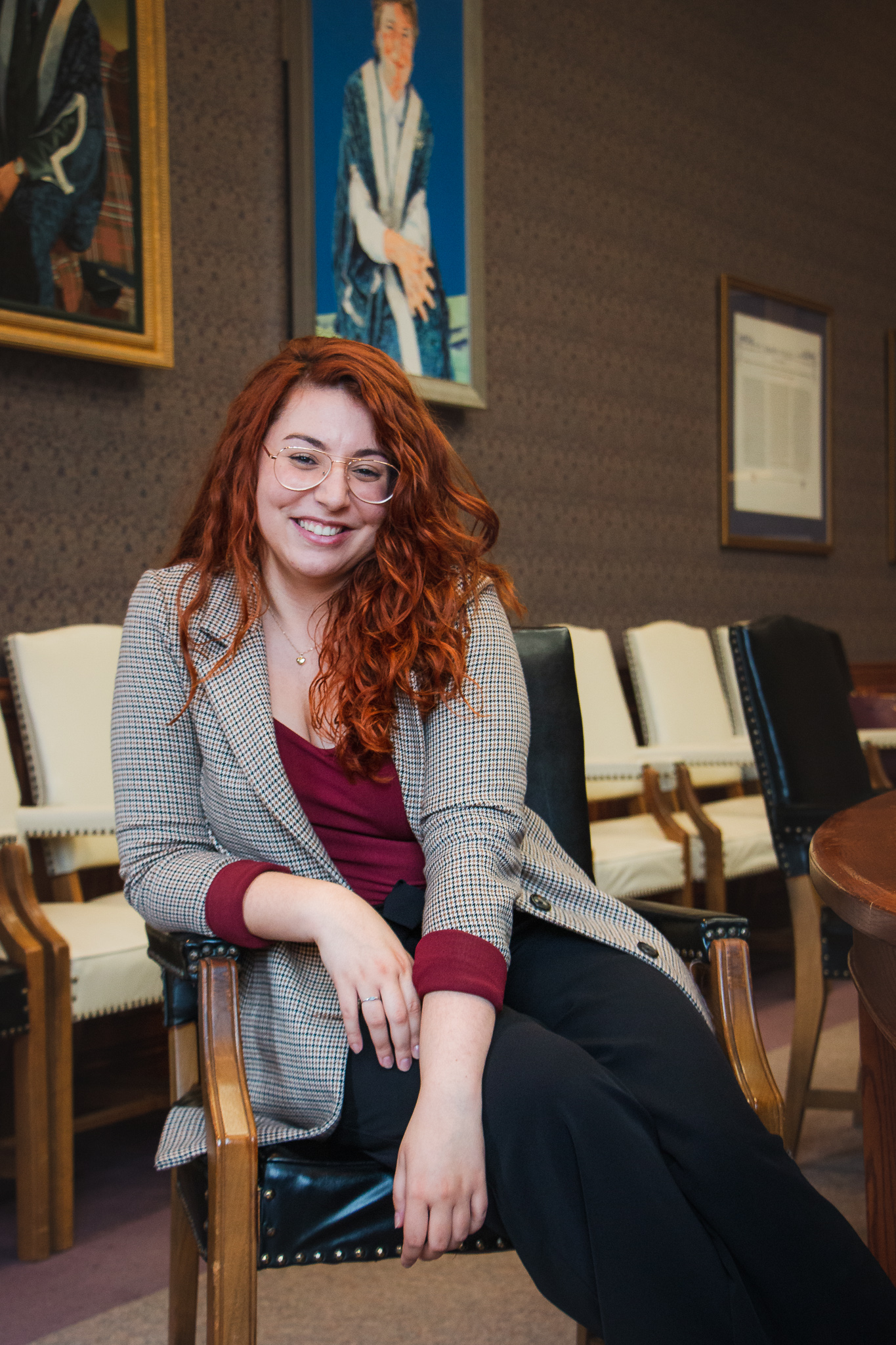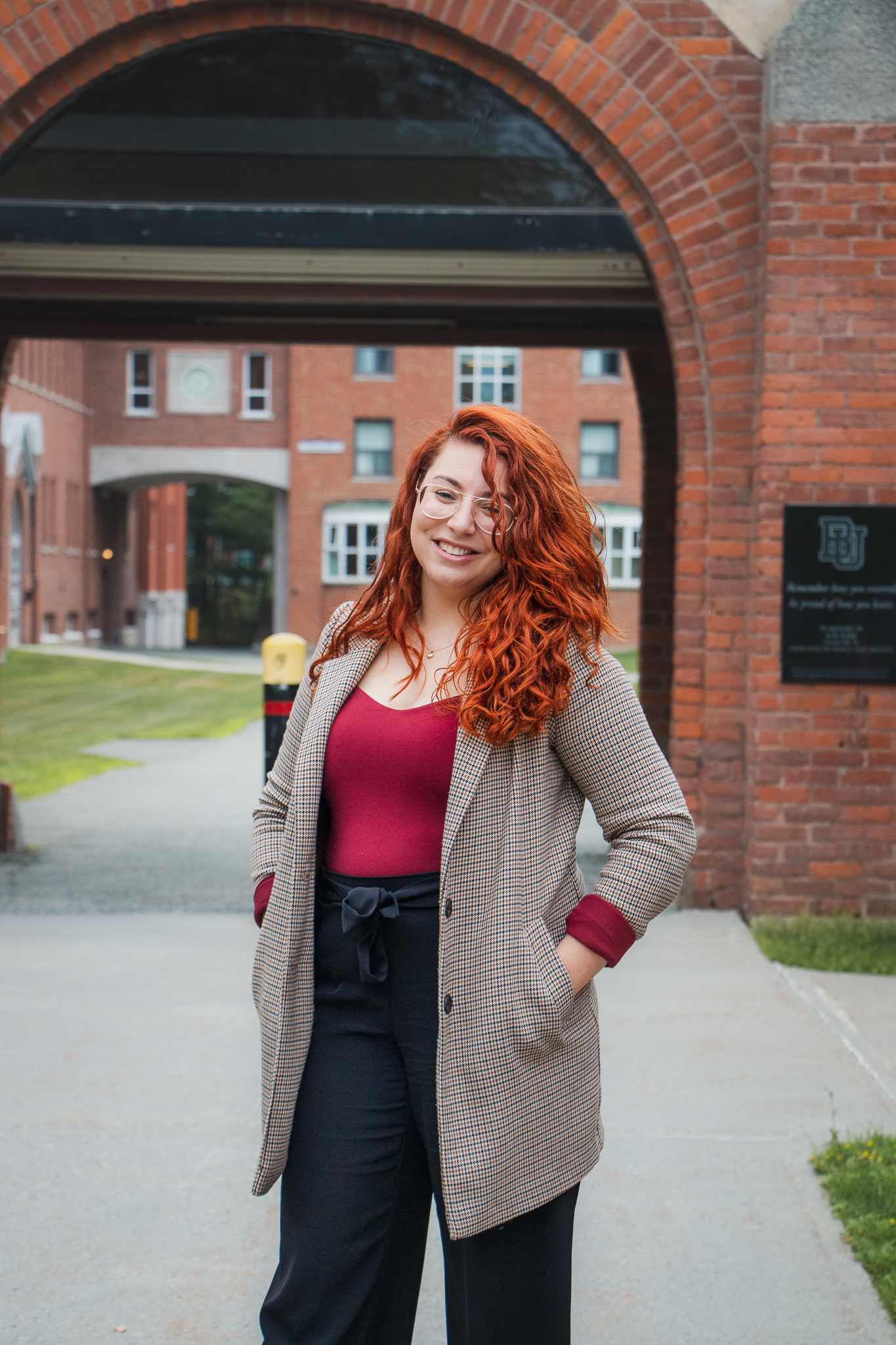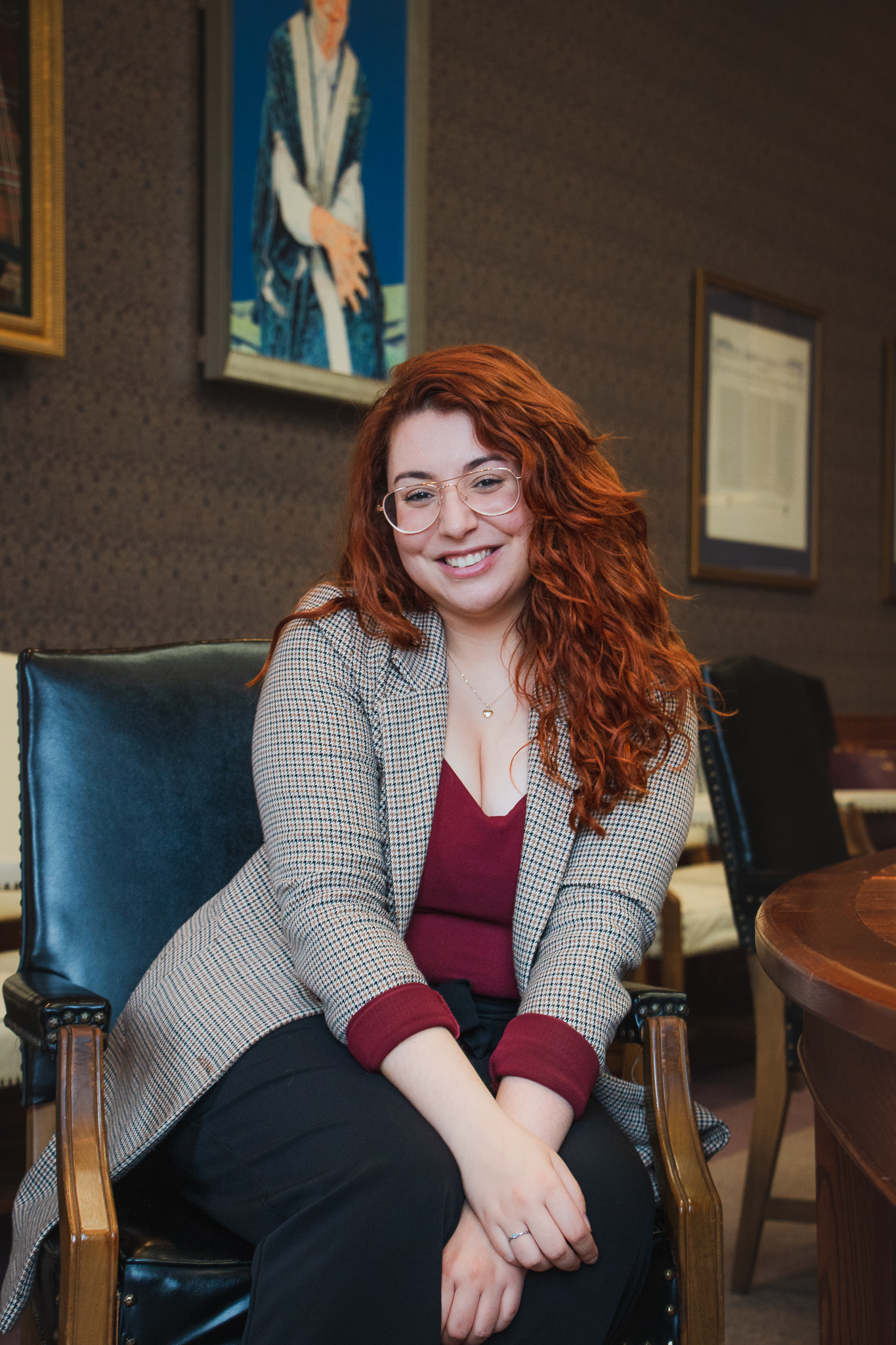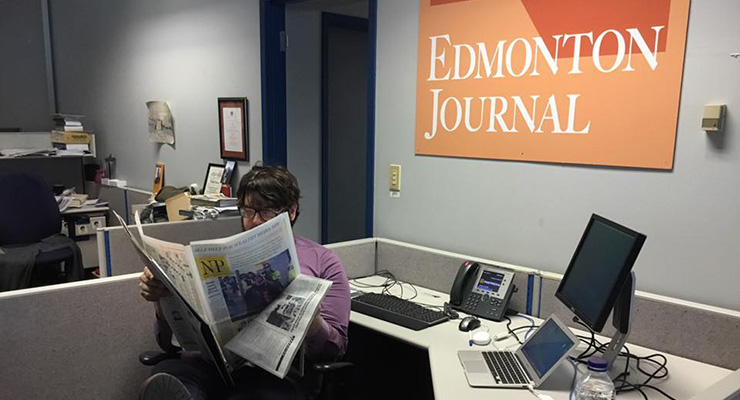‘Experiential learning will increasingly become a critical pedagogical component of the student’s experience here at UBishops. Providing opportunities for students to work in their field of study is invaluable for them to get hands on experience and apply their learning. Incorporating and devising experiential opportunities for students of all levels and in all fields is an exciting challenge.’
–Dr. Claire Grogan, Associate VP Academic.
Veronica Mongiardo is a fourth-year student doing a double major in Secondary Education and English, Honours degree in Literature, and a minor in Sociology.
She grew up in Laval, right beside Montreal. “Over there when you go to study at university you really go study at McGill or Concordia, that’s kind of like a given, you’re predestined because those are the schools that are there,” she explains. Veronica only ended up at Bishop’s after one of her professors at Dawson College recommended the university to her. “She told me how it was a school that could kind of mix and match programs together to build what you want to do out of the undergrad experience, and I was really intrigued. It was very expensive for me to do the move, but I was given the Chancellor’s Excellence Scholarship when I applied here so they were like ‘if you come here, we’ll give you the scholarship.’ … So, I decided to come to Bishop’s.” Although the distance away from her home and family initially scared her and remains difficult, she doesn’t regret her decision. “I think it was the best decision I could have made.”
One of the reasons that Bishop’s was a great decision is the flexibility it allows in her education. “My programs are amazing! I am in Education, Humanities and Social Sciences all at once and I love all of them!” Veronica hopes to teach Canadian literature at the postsecondary level someday and would love to bring together all her fields of interest to teach literature through sociological movements, and looking at the influence of history, sociology, and cultural movements. “I think that by being able to study, not only literature, … but also looking at sociology, that’s so important to know the theory, and know the movements, and know what it means, and apply that to my literature [degree].”
Although she says that her heart is in English, and an Education degree is not required to teach at the university level, she decided to do a double major with Education. She explains, “I think pedagogy is so important, I think whether you’re twelve years old or thirty-five, it’s important to know how to teach someone, how to impart knowledge on people. People have a certain psychology to learning, and I think that it’s important to know that, even if you want to teach at the university level … I was able to do all that in four years because Bishop’s is the way that it is. If I had gone somewhere else, I would have had to pick – you just do literature, or you just do education.”
But in the end, what made Bishop’s the perfect choice for her is the number of opportunities it offers. “At Bishop’s, opportunity is the key word, it’s something you don’t get at McGill [or Concordia]: you get these really great opportunities for learning in class, but Bishop’s offers you everything else. I wasn’t even at Bishop’s for more than three weeks and I had a research assistantship offered to me for later that year. My first year, I went to Ottawa to go study in the archives, second year I had my first conferences, it’s opportunity after opportunity … You can’t throw a stick, and not hit another job or a volunteer opportunity at Bishop’s, and all of them are useful to gain skills, and abilities for your future.” She laughs before adding, “I like to say that I haven’t had to apply for almost any position at Bishop’s because they find you.” Indeed, after her first year, Veronica’s involvement naturally snowballed: she participated in the Bishop’s Forum, eventually becoming a coach for 2020, got involved in the Bishop’s University Academic Honours Society (BUAHS), for which she will be the lead this coming year, published papers, was a panelist at conferences and worked as a Tomlinson intern, research assistant, marker, co-editor of the Mitre and teacher’s assistant. “I’ve worked with my mentor, Dr. Morra, ever since I’ve started at BU, [I was] in her class first semester of my first year, and I’ve been working alongside her for years now, and she has given me skills both in and out of the classroom that I’ve applied to my own things.”
The work that she did for Dr. Morra encouraged her to start her own projects and one of her papers is about to be published in 1890: A Journal of Undergraduate Research. “I think that my research work and what has led to me being able to do my own research is something that I’m most proud of.” She has also presented her own research at ETRC this year. “I’m able to directly transpose skills that I’ve learned to my own things. I’m coming out of Bishop’s, and I’ve already had like a mini career!”
About her work with Dr. Morra and Dr. Taylor, she says, “I love working alongside teachers, I want to teach someday so teacher assistantships are great. I worked with Dr. Taylor again for the second time in the fall … there’s not this academic hierarchy … as we have in other places, so it’s allowed me to be really close to some professors … and it’s not like, ‘well, I’m above you because I’m a professor and you’re a lowly undergrad,’ you know … [Dr. Morra] allowed us to present her paper, alone, at the National Congress this year, and when we were writing the paper with her, we would get into arguments, like, ‘listen, I disagree with this, and this,’ and she’d be like, ‘put it in’ and she would allow us to speak our piece and say, ‘listen now this is what I’m seeing’ and she’d be like, ‘go ahead, you’re right, because you’re seeing it, because you believe in it, go,’ and I think that’s something that all professors at Bishop’s, in some way, embody. You have your own voice, you have your own thoughts, and they trust in us to make those decisions, even in their own work, which is kind of astounding.”
As mentioned earlier, Veronica never quite applied for a position. “I think that it’s about, again, connection. Sometimes, you just click with people … of course opportunities are gonna come your way, because [professors] know you and they know who you are and how you work and your work ethic, so I never had to apply for a job … It’s a lot of these [word of mouth] situations … It’s being at the right place at the right time, and at Bishop’s, you’re always at the right place at the right time.” Veronica also uses a different mindset than most students, treating school like a job and presenting herself that way. “It makes a lot of people uncomfortable because I come in at 8am with heels and my blazer and I’m like ‘it’s okay, that’s my thing.’ I see coming to a class like my job, and it’s allowed other jobs to come in. And even if people don’t think that way, even if people come to school to have fun, to enjoy it, I still know people who get opportunities thrown their way.”
Veronica says that these experiential learning opportunities have been “everything” to her. “You learn critical skills. Whether that’s critical thinking, critical empathy or really hard skills, like public speaking, communications, social media, networking, all these opportunities are forcing you to step up … nobody teaches you, it’s not a class … it’s super hands-on hard knowledge that you just don’t learn in the classroom.” Comparing her list of involvements to the experiences that most students at big universities have, she observes that they simply don’t have the same number of opportunities offered at the undergraduate level. “Here, we’re given so much trust as youngsters to perform. I think that for me … it’s been paramount, it’s been everything. Without those skills, I wouldn’t feel prepared. I’d be still scared … I’m graduating in a year, and I feel ready now. Like if I had to leave now and find a job, I could. I’d feel confident in my skills because of what all this extra learning has given me.” She can also count on the mentoring of Dr. Morra to guide and prepare her for after graduation, while the good relationship she has built with professors will become great contacts into the professional world.
An additional layer of fear currently envelops students in the humanities, however, who are unsure of finding employment in their fields after graduation. “The humanities are having a hard time right now in the world that we are in, especially almost post-COVID world, the STEM is what’s taken over, so it’s scary as somebody that’s graduating from an English program or a film program or an arts program to go into the real world and find a job right now… people don’t value it as much anymore.” She adds, however, that we need those people now more than ever. “I think that the humanities are the most important thing right now. It is connection, pure empathy. We’re missing that connectedness right now and the humanities is what can bring that to us … Literature, and sociology, and working with people, it’s just empathy, you have to be connected, compassionately, to people. Everything I’ve done at BU, whether it’s my B.E.S.T. project … whether it’s the work that I’ve been doing on French-Canadians with ETRC, with queer studies with my own research, I think that it’s about connectedness with people.”
Although busy, Veronica says that she loves to take the time to enjoy the region in the summer. “The Eastern Townships are my favourite place in Quebec … it’s the most connected place and people I’ve ever seen. So you go to North-Hatley, you go to Compton, you go to Coaticook, you go to Lac-Brome, you’re gonna find these little tiny places that are like, ‘I just sell cheese’ … but then you go to take the cheese and they have like the bread from the local bakery, and they have the foie-gras that someone made from the other side of town, and they all support one another, and they all encourage one another. My favourite thing to do in the summer is to … go to these random little farms and try their product and everybody’s so welcoming, everybody’s so nice. And they want to share what they’re working on, they’re so proud of it. I absolutely love the Eastern Townships for that … it’s just so welcoming, so warm, c’est chaleureux. I went to Compton, and we had cheese from North-Hatley; I went to Coaticook, and we had little things from like Lennoxville … so I do that with my friends for the summers, and in the fall as well.”
Looking at the list of her accomplishments, it is hard to imagine how she found time to do everything. She laughs before adding that she does find time to sleep. “It looks like a lot when you take three years’ worth of things and put them in a list. It looks like a lot. I got anxiety looking at that list … but I pick a few things that to me are important that semester – I work semester by semester, I think that it’s one step at a time – this semester I’m like okay ‘I’m gonna take this and this and this’ and I’m gonna find time and make a schedule. I think time-management is of the utmost importance … And it’s about surrounding yourself with people you really need, I think. I don’t go through a semester without a study group, I don’t get to my semester without having a really strong support system of people who are there … I don’t take jobs with people that I don’t feel are supporting me and … mental health and self-care are really important too. I’m not gonna sit here and say, ‘you need to have that extensive list of like 10 extracurricular activities per year’, it’s not supposed to feel that way. You’re supposed to feel comfortable, and if you’re surrounding yourself with people that are welcoming and understand that and who understand boundaries and limits, then you feel good. And Bishop’s understands that. They’re very understanding when it comes to self-care … So, it looks like a lot when you look at it first glance. It’s three years’ worth of work for me … but it’s taking it one step at a time, surrounding yourself with people you care about and that care about you and who are gonna watch out for you.”
Veronica is now entering her fourth and final year at Bishop’s as she expects to graduate in 2022 and plans to move on to her master’s degree in the Fall of that year. “I want to go do a Master’s degree in Candian literature, hopefully going to study gender and queer relations in Canadian literature. That’s my plan right now. Something in the field of gender relations, queer, so anything around like masculinity scholarship, the way that people deal with the new changing world, and society, towards genders, the new terms that are coming out, the new theories that are coming out; I love that.” For Veronica, this year will be very stressful and anxiety-inducing as she starts applying to grad schools. “I’m gonna apply at a bunch of universities, as much as I can, see where I get picked. I hope I can go back home. I love the Eastern Townships, but I miss my people, I miss my family, so I’m really excited to hopefully go back to Montreal.”
Go to our website to learn more about the English program, the Education program and experiential learning:
https://www.ubishops.ca/academic-programs/faculty-of-arts-and-science/humanities/english/
https://www.ubishops.ca/academic-programs/school-of-education/
https://www.ubishops.ca/academic-programs/bu-liberal-education-model/experiential-learning/





